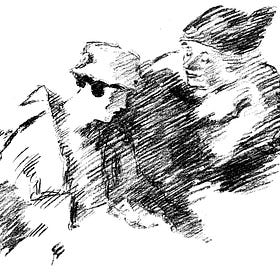—: The Rushlight :— I held the rushlight up for him to light his pipe. It trembled in me hands. It brought us awful near. He gave one pull, then waited for a bit. The red light flickered with a puff of wind. “Let you be holding it a wee bit nearer; There, that will do”—he laid his hand on mine. And somehow then the rushlight dropt between us, An' we were starin' in each other's eyes. His eyes they seemed to grow an' light an' darken; An' my breath choked, an' all me throat was dry. An' then we two drew ever close together, An' our lips met. The rushlight flickered out.
—: Winter :— Winter is an ould, ould woman: The falling snow is her long white hair. Her two feet are set from valley to valley, And her hands rest on the mountain-tops. The moaning wind is the sound of her keening, —Keening the death of her lost youth. And the greyness of the sky Will be the sorrow in her eyes. The shrill scream of the wild bird is the cry of her broken heart. The rustling of the rushes is her last song; And wherever she is passing It is desolation she will be leaving behind her.
Michael Mecredy, possibly from Ireland, published just five known poems in the English poetry journal Poetry & Drama, edited by Harold Monro, in 1913. ‘The Rushlight’, in particular, is a striking verse about queer intimacy, detailing what appears to be a tender first kiss between two men, written in ‘blank verse’ (largely iambic pentameter). It pairs beautifully with Florence Kipper Frank’s verse ‘The Kiss’ (1915). ‘Winter’ appears to be written in ‘free verse’, having no regular meter or rhyme, which would make Mecredy a part of the first wave of post-1912 ‘free verse’ poets (preceded in England by the School of Images in 1908-09, founded by F.S. Flint, Edward Storer, and T.E. Hulme).
“Who is Michael Mecredy? His name and the convention he adopts suggest Irish affinities. In the poems given show an attraction towards the style of Seosamh MacCathmhaoil (aka. Joseph Campbell) and James Stephens... No doubt his own individuality will break clear in a while; he has a feeling for language and for the folk surroundings.” (The Irish Review, 1913)
Hiya all - things will be a little bit quiet on Forgotten Poems for the moment as I am working on an essay for the newsletter about the early history of one of my favourite poetic forms, the monostich (one-line poem) in connection to ancient Greek poetics, prophecy, and philosophy. More on this soon! I still hope to get some poems up once a week though. In lieu of my usual “after” poem here is something new, inspired by my current research . . .
Of Stitches and Streams By Dick Whyte O pen! more nonsense— any more than a line or two too many still, perhaps too few deities de-stitching into densities, streams flowing backwards there will be no poetry where we are not going
Forgotten Poets Presents:
Forgotten Poems, a living anthology of obscure and out-of-print poetry from the late-1800s and early-1900s. Explore the archives:
Florence Kiper Frank - The Kiss (1915)
—: The Kiss :— Sheer joy of youth and madness of the moon And all the illimitable longings of my blood Leapt in me. I was half mad with the sweet Delirious feel of living. It was then I caught her eyes upon me, misty veiled, And unashamed I kissed her on the mouth...
J. Crutchfield Thompson [Langston Hughes] - 4 Very Short Poems (1926-27)
—: Pensée :— I would not like to see you Dead Because you are ugly now; In death You would be uglier.











![J. Crutchfield Thompson [Langston Hughes] - 4 Very Short Poems (1926-27)](https://substackcdn.com/image/fetch/$s_!ME9K!,w_280,h_280,c_fill,f_auto,q_auto:good,fl_progressive:steep,g_auto/https%3A%2F%2Fsubstack-post-media.s3.amazonaws.com%2Fpublic%2Fimages%2Ffbe003b3-13dd-4791-838f-4d6fc1300d83_1000x1184.jpeg)
Thanks for sharing these poems, Dick. I especially enjoyed the second one. Several lines stand out, but the rhyming couplet,
"And the greyness of the sky
Will be the sorrow in her eyes."
It may be my favorites.
That first poem—Rushlight—is just amazing. He so captures that moment of a first kiss, the tension, the buildup, the relief. So lovely. I’m looking forward to your essay.